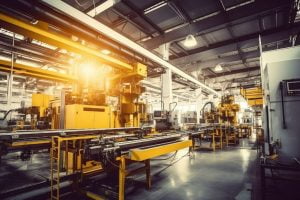In an industrial world where competition is strong, you must keep productivity running high. Discover current strategies to improve your manufacturing process.
In the past decade, there’s been a noticeable shift in how manufacturers view their processes, stimulated by technological advances, environmental concerns, and consumer demands for transparency and sustainability. This evolution is not just about adopting new technologies but also about rethinking manufacturing to incorporate lean management, waste reduction, energy efficiency, and the use of renewable resources.
Innovative companies are leading the charge, transforming their operations with smart factories, predictive maintenance, and circular economy principles. Learning about the current strategies to improve your manufacturing process will help you achieve the intricate balance between operational efficiency and sustainable practices.
Lean Manufacturing
Lean manufacturing is not a new concept, but it remains one of the most efficient ways to improve production. It focuses on minimizing waste without sacrificing productivity. Implementing lean principles involves examining every stage of your manufacturing process to identify the misuse of resources, including time, materials, and labor. Once you identify these areas, you can streamline your processes, resulting in faster production cycles, lower costs, and improved product quality.
Automation and Robotics
The integration of automation and robotics in manufacturing processes has been revolutionary. Automation technology can increase production rates and consistency, as robots work with a precision that manual labor cannot match. You can use these technologies in hazardous conditions or tasks that pose health risks to human workers, increasing safety in the manufacturing environment.
Sustainable Practices
Sustainability has become a key focus in manufacturing. One significant step toward greener manufacturing is the development of eco-friendly processes for packaging manufacturers. This involves everything from sourcing sustainable materials to recycling and reducing the energy consumption of manufacturing facilities. By adopting eco-friendly packaging solutions, you comply with increasingly strict environmental regulations but also meet consumers’ demand for sustainable products.
Advanced Analytics and Big Data
Utilizing advanced analytics and big data allows for the thorough examination of manufacturing processes. By analyzing data, you can identify inefficiencies and process bottlenecks, predict potential machine failures, enhance quality control, and make decisions that could lead to substantial improvements in productivity and efficiency.
3D Printing and Additive Manufacturing
3D printing technology, also known as additive manufacturing, is leading to a shift in how companies think about product design and production. With the ability to create complex shapes that would be impossible or too costly with traditional manufacturing, 3D printing streamlines the production process. It can also significantly reduce waste, as it uses only the material necessary to build the product layer by layer.
Improving your manufacturing processes is an ongoing effort necessary to stay competitive in the market. By embracing these strategies, your business can achieve greater efficiency, healthier margins, and a smaller environmental footprint.





















